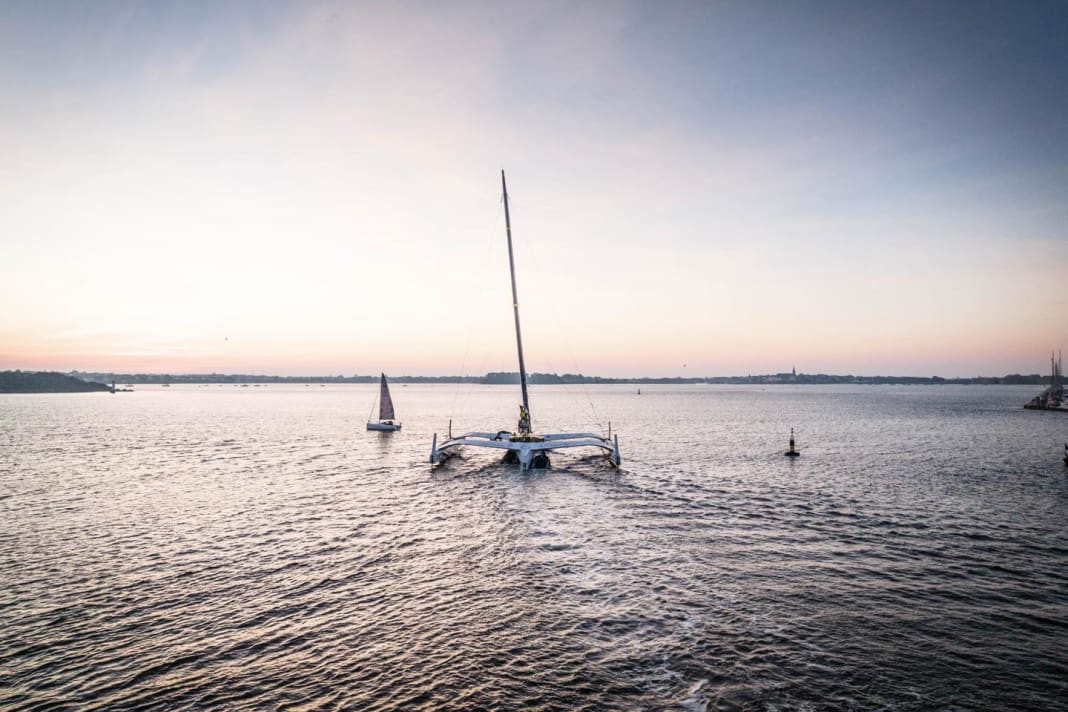





The Jules Verne Trophy is one of the most important challenges in international sailing. Since 1990, it has rewarded the fastest circumnavigation of the world under sail - non-stop and without outside help. The current record holders are Francis Joyon and his "Idec Sport" crew. In 2017, they sailed around the world in 40 days, 23 hours and 30 minutes. In doing so, they halved the time set by French author Jules Verne, whose protagonists in the novel "Around the World in 80 Days" travelled a little slower.
The starting line of the race against the clock is an imaginary line between the Phase du Créac'h lighthouse on the French island of Ouessant and the Lizard lighthouse on the British peninsula of The Lizard. In a Jules Verne circumnavigation, the South African Cape of Good Hope, where the Ocean Race fleet crossed the finish line today, the Australian Cape Leeuwin and the South American Cape Horn must be left to port.
"It's the beginning of a great adventure"
To achieve their goal, Charles Caudrelier, Franck Cammas and the Gitana crew must reach the start and finish line before 13:38:59 German time on 25 March 2023. The team has been ready for the attempt since late December and now wants to know. The Gitana racing team said: "It's the start of a great adventure. This finally marks the start of the ocean race against the clock - one of the most exciting challenges on the sailing planet."
At this point, you will find external content that complements the article. You can display and hide it with a click.
The team said that preparing for this moment required a lot of patience, a thorough study of the conditions and the search for a favourable weather sequence between the North and South Atlantic. The team went on standby on 22 December, just a few weeks after Charles Caudrelier's Route du Rhum victory. The crew is advised by router Marcel van Triest. And indeed, on 12 February, a window opened for the team to start from the north-western tip of Brittany.
It is not a typical, ideal weather window at first glance. And yet it tempted the Gitana crew to give it a try. Charles Caudrelier said pragmatically: "It's almost impossible to have a perfect scenario anyway." While the conditions on the North Atlantic seem well suited, the passage to the south looks less ideal at first glance. As always with the Jules Verne Trophy, the crew will have to put in the best possible effort, but also the luck of the brave.
On the hunt for low-pressure areas, strong winds and the best conditions, the Gitana team wants to continue writing sailing history. In addition to co-skippers and friends Charles Caudrelier and Franck Cammas, the crew also includes trimmer and foreshipman David Boileau, helmsmen and trimmers Erwan Israël and Morgan Lagravière as well as trimmer and on-board reporter Yann Riou.
Update from 13 February 2023: The record hunters had to turn around on the evening of their record attempt and return to their home port of Lorient. Engine damage to the generator could not be repaired at sea. In a statement, the Gitana team said: "The generator is essential for charging the batteries on board to ensure the autonomy of the crew on their adventure around the world." However, the goal of the record attempt remains the same. Co-skippers Charles Caudrelier and Franck Cammas are still hoping for another chance with the crew on standby until the beginning of March.

Tatjana Pokorny
Sports reporter
